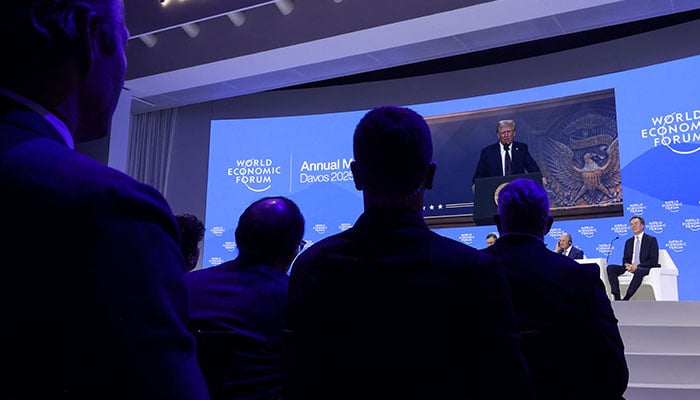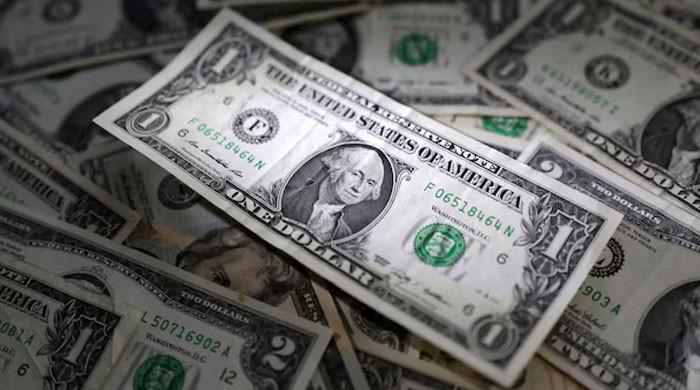Trump demands interest rates cut, says he knows monetary policy better
"With oil prices going down, I'll demand that interest rates drop immediately," Trump told WEF in Davos
January 24, 2025

- Trump says knows interest rates much better than those in charge.
- Fed set interest rate target in December, between 4.25% and 4.5%.
- Powell previously stressed need for caution in cutting rates further.
WASHINGTON: Donald Trump has urged the Federal Reserve to cut interest rates, insisting that his understanding of monetary policy is better than that of the officials in charge, despite the central bank's current pause on rate changes.
"With oil prices going down, I'll demand that interest rates drop immediately, and likewise, they should be dropping all over the world," Trump told the World Economic Forum on Thursday in Davos, Switzerland.
At a White House event following those comments, Trump said, "I think I know interest rates much better than they do, and I think I know it certainly much better than the one who's primarily in charge of making that decision," in an apparent reference to Federal Reserve Chairman Jerome Powell, whom Trump appointed as the Fed leader in his first term as president.
Trump's remarks come five days before the Fed's first policy meeting to be held during his administration—on 28 and 29 January—with very broad expectations that officials will leave rates unchanged.
The Fed last cut its overnight interest rate target by a quarter percentage point at its December policy meeting to between 4.25% and 4.5%.
For all of 2024, the Fed lowered rates by a full percentage point amid easing inflation pressures and a sense among Fed officials that they wanted monetary policy to exert less restraint on the economy's momentum. The December meeting also saw officials trim estimates of cuts in 2025 amid expectations of higher levels of inflation and slightly better growth.
Trump's comments on Fed interest rate policy are highly unusual for presidents in the modern era and conflict with the agency's design of setting interest rate policy independently. The Fed, which does not have to follow any instructions from the president, did not immediately respond to a request for comment.
Policy uncertainty
A number of Fed officials, including Powell, have already expressed a need for caution about lowering rates further because of sticky inflation. Several policymakers had made an effort to take potential Trump policies into account in new forecasts issued at the December policy meeting. Lowering rates when inflation is still above the Fed's 2% target could prompt price pressures to worsen rather than improve.
Speaking last week, New York Fed President John Williams noted that uncertainty surrounding government policy actions makes it particularly hard to offer guidance about the outlook for monetary policy right now.
"The economic outlook remains highly uncertain, especially around potential fiscal, trade, immigration, and regulatory policies," Williams said. "Therefore, our decisions on future monetary policy actions will continue to be based on the totality of the data, the evolution of the economic outlook, and the risks to achieving our dual mandate goals."
Trump's pursuit of large-scale tariffs on America's trading partners, which are de facto taxes on imports, together with his plan to deport large numbers of undocumented immigrants, run a real risk of reigniting inflation pressures, in the view of many economists and investors. The question that would then loom is whether Fed officials believe the price increase is a one-off or the start of a more enduring rise, which could in turn call for higher interest rates.
Some Fed officials believe enough clarity could soon arrive on the inflation front to get back to lowering rates. Citing recent favourable price pressure data, Fed Governor Christopher Waller told CNBC on 16 January that "if we continue getting numbers like this, it's reasonable to think that possibly rate cuts could happen in the first half of the year."
Waller, who was selected as a Fed governor by Trump and took office in 2020, has also been somewhat sceptical that the trade tariffs envisioned by Trump will drive up inflation in the way many economists reckon. He said on 8 January that, "if, as I expect, tariffs do not have a significant or persistent effect on inflation, they are unlikely to affect my view of appropriate monetary policy."
Trump was broadly critical of the Fed for raising rates during the first two years of his first term in office and lambasted Powell, whom Trump had elevated to lead the US central bank, for leading that effort. Powell's term as Fed chairman ends in 2026, and before taking office, Trump said he was not inclined to remove Powell early, amid legal questions about whether such an action would even be possible.











